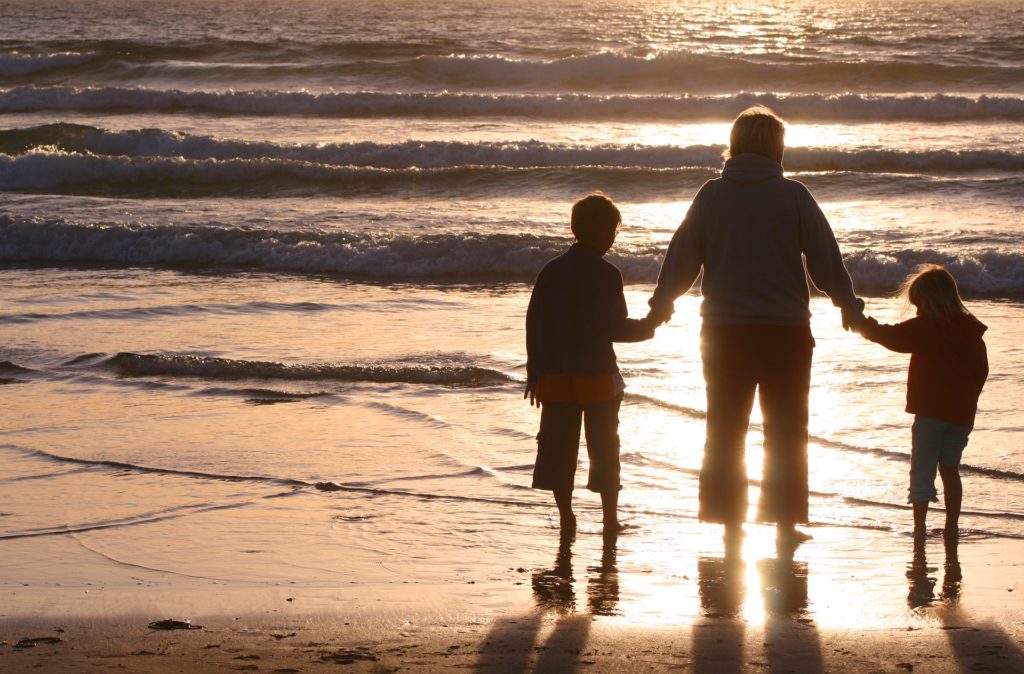
If one of your kids is struggling with a math puzzle, it is important to teach them the calculations behind it, not simply complete the puzzle for them.
However, you wouldn’t start by teaching a 7-year-old at the level of trigonometric identities or logarithmic functions (I don’t even know what those are!). You might, for example, explain properties of shapes and areas. Then your kid will be able to master the puzzle and grow in their sense of self and security.
Understanding Developmental Appropriateness When Discussing Sex Addiction
The same is true when it comes to teaching our kids about the stressors, struggles or problems we face. You and your spouse may be wrestling with sexual addiction treatment, fights and betrayal, yet your kids are not ready for these discussions. It is well known that development happens in stages, and that kids process information differently within those stages [1].
A key factor to consider is that young children aren’t able to consider that others are responsible—they attribute the world to themselves. This seems mind-blowing to us as adults, but at one point everything was your fault or doing.
So if Mom was mad, it was because “I” did something wrong. Or if Dad was sad, “I” was disappointing, etc. It is only at ages 5 to 8 that children develop the ability to see from another person’s perspective [2]!
You must consider what information your kid can process and understand before you explain or disclose any information that could confuse, traumatize or otherwise disrupt them.
If you are struggling to know what is age appropriate, consult a development guide or a professional who works with children to illuminate the impact of sexual addiction on kids. For now though, there are some general guides to follow that build on this developmental understanding.
Communication and Ongoing Conversations Within the Family
Once you have discerned what is developmentally appropriate to share with your kids, you can start an ongoing conversation. Kids can rarely digest all of what we want to give them and need less, rather than more, but with the understanding that they can come and ask questions at any time [3].

This openness to questions gives them a sense of safety with you and the knowledge that they are taken seriously and are important to you. You need to foster an environment of appropriate openness.
Honesty is also vital. Children are far more aware than we wish to believe, their brains are made this way.
We learn by absorbing information and your kids are watching you. If there is tension, lying, hiding, withdrawal or any of the myriad experiences of sexual addiction in your home, the kids are being impacted by it. It is far better for them to understand what is impacting them.
This doesn’t necessarily mean talking about sex addiction, but it does mean explaining what they are seeing or experiencing.
For example, “Daddy is acting grumpy a lot, he is trying to live without something he used to love, and it is hard for his body to get used to it, so he feels tired and grumpy. It isn’t right for him to be grumpy, and he is working to make it better. How are you feeling about his grumpiness?”
This level of honesty allows kids to make sense of the situation, and also express their needs. Older kids may be able to understand and be told about sexual addiction itself.
Safety is also paramount. Kids are curious and will likely explore or try and find out about “sex addiction” if you tell them about it. You are responsible to discuss struggles with them so that they are prepared for the world, but don’t rummage around in, or hide things they are not prepared to handle. You don’t give a little kid a sharp knife, right?
Kids will need empathy and understanding of their emotional reactions and the assurance that they can trust you to “hold” or accept their experience without punishing them through your frustration or impatience.
This may require you to work on your patience, your own pain and learn how to breathe slow and soothe yourself as you attend to another even while you are hurting or exhausted. Again, remember to consider their developmental age and how they may need you to soothe them.
Behavioral Warning Signs in Children
Kids normally display transitions and turmoil in families behaviorally. They don’t process and express in the ways we always want. Look out for your kids showing any of the following, and follow up with them about how they are doing and what they are feeling:
- C
 onfusion
onfusion - Insecurity
- Regression in behaviors (bedwetting, etc.)
- Anger/hostility
- Acting out themselves
- Distancing from you or others
Whilst this is a daunting and tricky task, remember this great comment: “Experts have scared the stuffing out of parents by implying the challenge of raising children is too complex… [4]” Don’t believe it; prepare, listen, answer and care for your kids and you will be well on your way!
 About the author: Paul Loosemore, MA PLPC, author of “21 Movements Towards Life” – The step-by-step guide to recovering from sexual addiction or pornography. Paul works as a mental health counselor, and consults with those who wish to recover from Sexual Addiction—both individuals and couples. He is the founder of www.stopsexualaddiction.com where you can find his guide, or contact him.
About the author: Paul Loosemore, MA PLPC, author of “21 Movements Towards Life” – The step-by-step guide to recovering from sexual addiction or pornography. Paul works as a mental health counselor, and consults with those who wish to recover from Sexual Addiction—both individuals and couples. He is the founder of www.stopsexualaddiction.com where you can find his guide, or contact him.
References:
[1]: Saenz, K. P., Bee, H. L., & Boyd, D. (2008). Lifespan development. Upper Saddle River: Pearson Education (US).
[2]: http://www.rsd.k12.pa.us/Downloads/Development_Chart_for_Booklet.pdf. Accessed May 26, 2017.
[3]: Bowman, T. (2013). Angry birds & killer bees: talking to your kids about sex. Kansas City, MO: Beacon Hill Press of Kansas City.
[4]: Allender, D. B. (2005). How children raise parents: the art of listening to your family. Colorado Springs, CO: Waterbrook Press.
The opinions and views of our guest contributors are shared to provide a broad perspective of addictions. These are not necessarily the views of Addiction Hope, but an effort to offer discussion of various issues by different concerned individuals.
We at Addiction Hope understand that addictions result from a combination of environmental and genetic factors. If you or a loved one are suffering from an addiction, please know that there is hope for you, and seek immediate professional help.
Published on July 13, 2017.
Reviewed By: Jacquelyn Ekern, MS, LPC on July 13, 2017.
Published on AddictionHope.com
